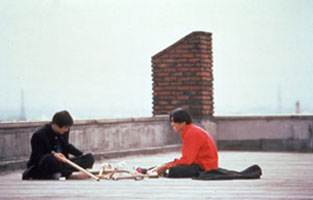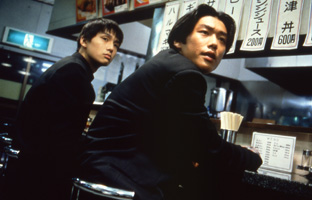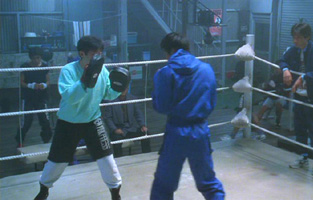Shinji and Masaru are best friends with much in common; they’d rather slack 24 hours a day, 7 days a week, than do anything productive. They constantly skip classes, although hang out on school grounds, bullying their classmates for money and creating havoc for the staff. Karma catches up with them when they shake down the wrong kid, whose brother just  happens to be a boxer. After tasting a bit of their own medicine, Masaru declares he’ll join a boxing gym in order to learn the sport, but of course only for the purpose of revenge. Shinji tags along, as the two essentially are attached at the hip, and he becomes genuinely interested in becoming a professional boxer, quickly outshining Masaru, who obviously is in it for all the wrong reasons.
happens to be a boxer. After tasting a bit of their own medicine, Masaru declares he’ll join a boxing gym in order to learn the sport, but of course only for the purpose of revenge. Shinji tags along, as the two essentially are attached at the hip, and he becomes genuinely interested in becoming a professional boxer, quickly outshining Masaru, who obviously is in it for all the wrong reasons.
One day at a local café, the boys encounter a local Yakuza gang, who end up treating them nicely and buying them drinks. Enchanted, and realizing that he needs to be good at something as well, Masaru falls in with them and is eventually accepted into the group. This strains the relationship between the two best friends, as they can never seem to find time for one another any longer. That seems okay though, as Masaru is showing the type of initiative that sees him moving up the gang’s ranks quickly, and Shinji is becoming the star boxer at his gym, and eventually finds himself in the main events. But the influence of the new people around them isn’t the best, and the two soon find out that actually attempting to succeed in the real world may not be all it’s cracked up to be.
Those that are only familiar with Takeshi Kitano from his work on Yakuza films will definitely have their eyes open to something different if they decide to check out Kids Return. That isn’t to say it’s bad at all though; quite the contrary. Kids Return is one of Kitano’s finest films. Unlike what he does with many of his films, Kitano chooses to play it straight here. There are no random moments that will have you scratching you head,  no multiple story threads that will have your brain sweating to keep up. No, this is a simple story, yet in the hands of Kitano, it rises above the norm. The emotion he pours into many of the scenes is extremely effective, yet doesn’t feel manipulative in the least, and by the time the credits roll, you’ll truly feel like you know and have been up and down the road (and back again) with Shinji and Masaru.
no multiple story threads that will have your brain sweating to keep up. No, this is a simple story, yet in the hands of Kitano, it rises above the norm. The emotion he pours into many of the scenes is extremely effective, yet doesn’t feel manipulative in the least, and by the time the credits roll, you’ll truly feel like you know and have been up and down the road (and back again) with Shinji and Masaru.
That isn’t to say that Kitano has completely forgotten his roots. With Masaru joining a Yakuza gang, you can be sure there are a few outbursts of unbridled, sudden violence throughout. Likewise, Shinji has a few knock-down, drag-out fights in the ring that are fantastically shot, and as far as I’m concerned are every bit as intense as anything you’ll find in a Rocky flick. Even the world in which Kids Returns takes place, which is pretty much as realistic as possible, is full of hardship and lacks understanding. This is what makes the sentiment of the film so much more poignant, as no matter what crap life deals these characters, they just seem to role with the punches and enjoy their existence for what it is.
To lend the film a bit of context, Kitano was involved in a fairly serious motorcycle accident in 1995, which nearly left him for dead. Kids Return was the first film he directed following the incident, and it feels very much like a response to that near-tragedy. It definitely seems like Kitano is using the film to reminisce on his own youth, but also offers it  up as a cautionary tale about trying to change your life in a way that doesn’t suit your own personal happiness. While Shinji and Masaru did certainly branch out and try their hands at different things, they ultimately ended up right back where they began, drifting through life aimlessly, just like most of their classmates and teachers, yet they all seem quite content about it. Kitano took up painting after his accident, and changed the way he conducted much of his life; it’s hard to discern whether he’s trying to convey that change is something to strive for, or if walking in an endless circle is fine if that’s what makes you happy, but regardless the film will probably have you reflecting on your own personal drive in life.
up as a cautionary tale about trying to change your life in a way that doesn’t suit your own personal happiness. While Shinji and Masaru did certainly branch out and try their hands at different things, they ultimately ended up right back where they began, drifting through life aimlessly, just like most of their classmates and teachers, yet they all seem quite content about it. Kitano took up painting after his accident, and changed the way he conducted much of his life; it’s hard to discern whether he’s trying to convey that change is something to strive for, or if walking in an endless circle is fine if that’s what makes you happy, but regardless the film will probably have you reflecting on your own personal drive in life.
Kids Return is a definite departure for Takeshi Kitano, but luckily it’s a damn good one. You can only make a certain style of film for so long until it gets stale, and while I’m not saying Kitano has ever allowed himself to become so, it’s great to know that he’s open to trying new things, and it’s even greater to know that he can pull them off just as well. If you’re a Kitano fan, Kids Return is essential. Even if you’re not, track this one down. It’s just that good.
As part of UK outfit Second Sight’s collection of Takeshi Kitano films, Kids Return is presented in 1.85:1 anamorphic widescreen (PAL format). The quality fares better than the releases that have been reviewed here thus far (Violent Cop and Boiling Point), as not having to convert the source from NTSC makes for a much stronger transfer. Color reproduction looks good, and this is overall very pleasant to look at (it fact, it may be the best the film has ever looked). The audio is given a normal Dolby Digital 2.0 mix (the way the film was released; Kitano's yakuza films from Second Sight were given a 5.1 remix), and is perfectly suited for the laid-back nature of the film. There are no extras.
Please feel free to discuss "Kids Return" here, in our forums!

